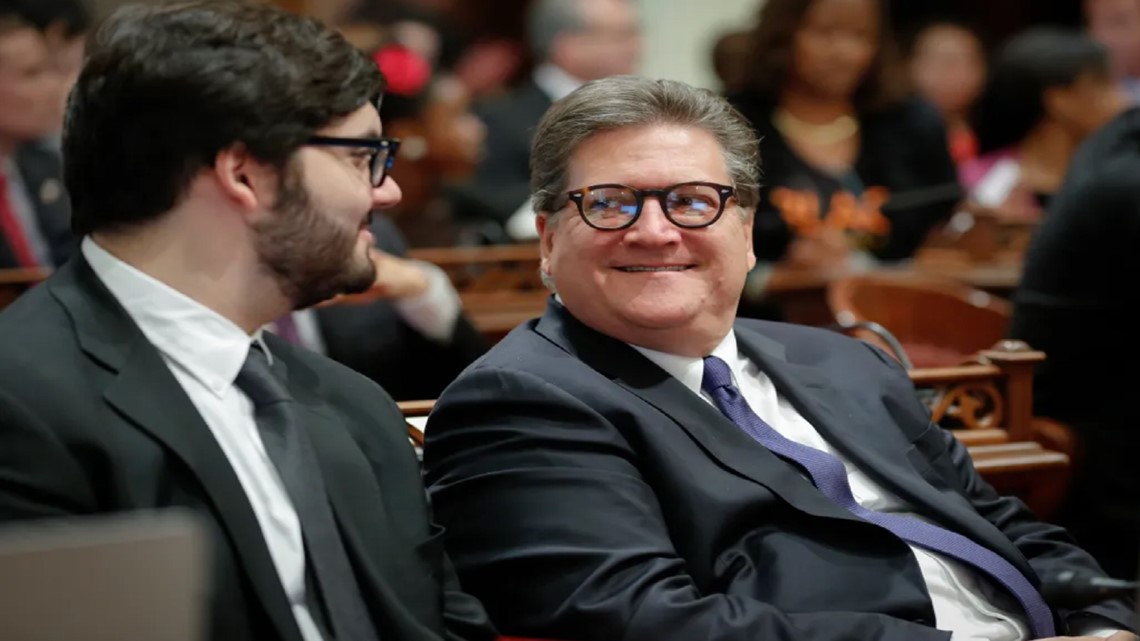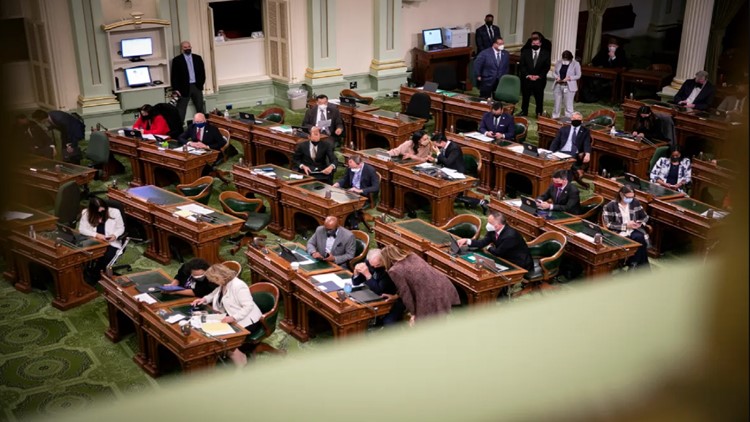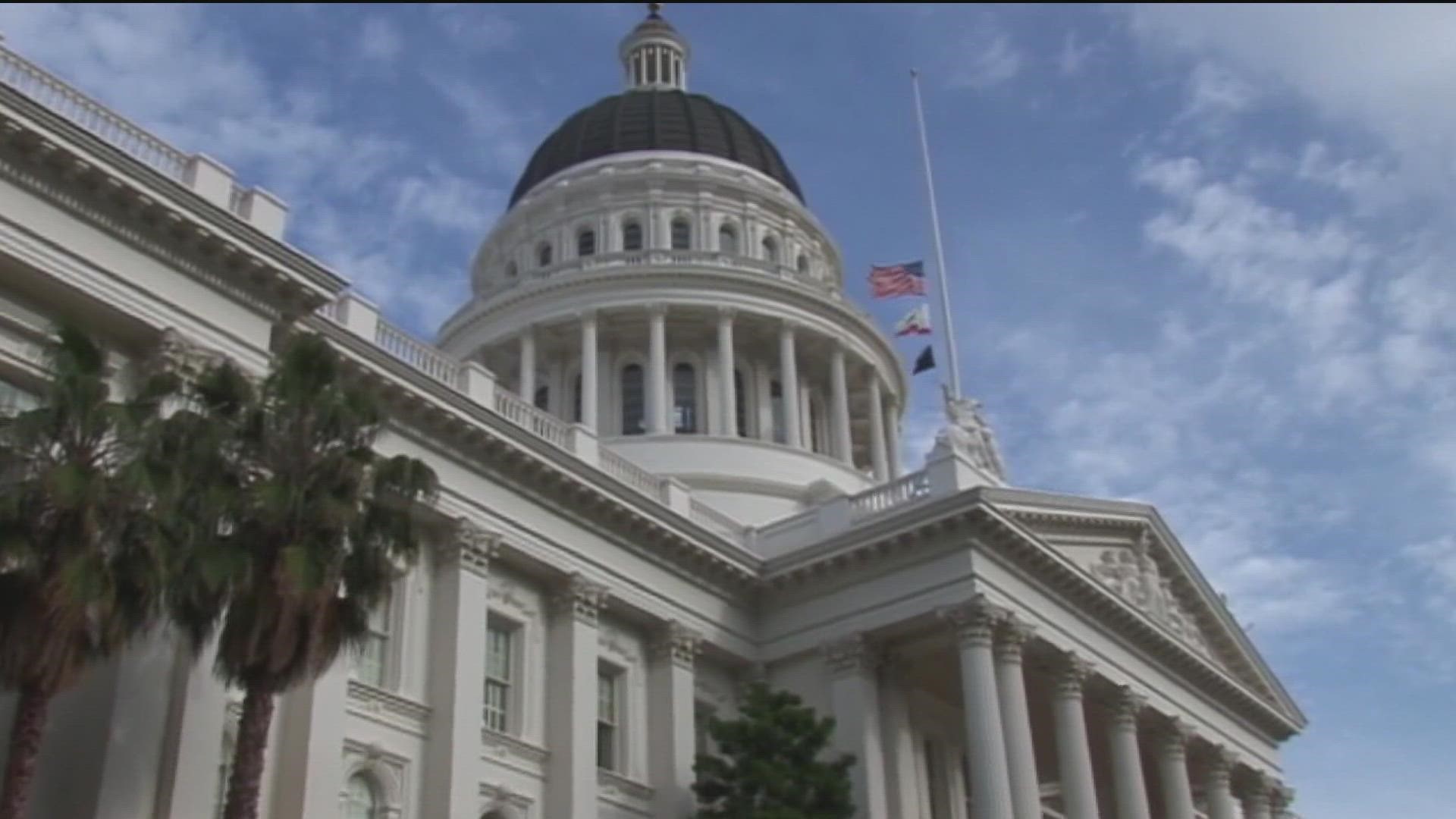CALIFORNIA, USA — This story was originally published by CalMatters.
Bulmaro “Boomer” Vicente knew his campaign was a long shot.
A 26-year-old Democrat with no elected experience and little name recognition, he had made an against-the-odds decision to take on Democratic Assemblymember Tom Daly, who has represented Anaheim in the Legislature since 2012. Ballots across California are full of slim-chance candidates like Vicente. The state Legislature is not.
But for Vicente, the utter unlikeliness of his victory was part of the point. His campaign, he said, was about “changing the narrative” of what it meant to be a legitimate political player in his hometown of Santa Ana. The message he hoped to convey: “You don’t really have to follow this pipeline.”
Then on March 10 — a day before the candidate filing deadline — came the one-two punch. First, Daly announced that he would not be seeking reelection. Vicente’s phone blew up. All of a sudden, politicos across the district were “taking a second look” at his candidacy, he said.
But hours later, the second punch landed: Daly’s district director Avelino Valencia, an Anaheim City Council member, entered the race with the backing of his boss. A new presumptive frontrunner had entered the race, fresh from the “pipeline.”
There is nothing unusual about outgoing incumbents endorsing their would-be successors. Nor is it unusual for them to support candidates with whom they share personal and professional ties. The last-minute timing of Daly’s withdrawal from the race and subsequent endorsement is also a common maneuver — and a perfectly legal one.
But this year’s bumper crop of vacancies in both the Assembly and Senate means there are an unusual number of departing legislators doing their best to bequeath their seats to chosen successors. It’s a trend that highlights just how small and insular the Legislature can be.
Where such behavior can cross an ethical line is when a lawmaker effectively “denies other candidates a fair shot…by essentially gaming the system,” said John Pelissero, a senior scholar with Santa Clara University’s Markkula Center for Applied Ethics.
Just to name a few more examples from this year:
- Democratic state Sen. Bob Hertzberg is termed out of his seat in the San Fernando Valley. As he runs to be a Los Angeles County supervisor, he’s throwing his considerable political weight behind Daniel Hertzberg. Connection: That last name is no coincidence. The two are father and son.
- In late January, Democrat Autumn Burke departed the Assembly early to take a job with a lobbying firm. The next day, she endorsed Robert Pullen-Miles for her Inglewood seat. Connection: Pullen-Miles is Burke’s former district director.
- Democratic U.S. Rep. Jackie Speier announced her retirement last November. A few weeks later she backed San Mateo Assemblymember Kevin Mullin to take her spot. Connection: He served as her district director, and Mullin’s father was a close political ally of Speier’s.
Unfair maneuvers or elevating the most qualified?
Vicente called the last-minute switcheroo in the Anaheim seat a “political move” designed to “deter other people” from jumping in.
Valencia, Daly’s pick in the race, disagrees. He said his boss informed him that he would not be running for reelection only one day before making the news public and encouraged him to run. State law grants a five-day filing extension when an incumbent doesn’t run, which also gave other interested candidates plenty of time, he said.
“If you don’t know 40 people in your Assembly district to gather signatures in a day or two, then you probably shouldn’t be running for Assembly,” he said.
And though he entered the race with the incumbent’s backing, he said his resume is hardly that of a typical candidate: The son of Mexican immigrants and the first person in his family to go to college, he said he was first encouraged to apply for a job in the Legislature by a political science professor at San Jose State. The nine years he spent working as a staffer, seven of them with Daly, have prepared him “to really make a difference and hit the ground running.”
Staffers often form the bench of potential fresh-faced candidates, though sometimes the relationship between incumbent and their designated replacement is less direct.
Consider state Sen. Sydney Kamlager, who is now running for the congressional seat soon to be vacated by fellow Democrat Karen Bass, a candidate for Los Angeles mayor.
The connection? In 2010, Holly Mitchell took Bass’ place in the state Assembly with Bass’ endorsement. When Mitchell made the jump from Assembly to state Senate three years later, she endorsed Kamlager, her former district director, to take her spot. Last year, when Mitchell left the Senate to win her seat on the Los Angeles County Board of Supervisors, Kamlager once again took her boss’ place with her endorsement.
And who took Kamlager’s seat in the Assembly with her blessing? Her former policy advisor, Isaac Bryan.
Like Daly, Assemblymember Mark Stone, a Democrat from Santa Cruz, also waited until the last minute to tell the world that he would be stepping aside at the end of this term. He promptly threw his support behind former Santa Cruz County Clerk Gail Pellerin.
Stone’s office did not respond to a request for an interview. Pellerin, who had been planning to run in 2024 when Stone would be termed out, said she was as surprised as anyone when he called her on the candidate filing deadline to break the news.
“My hope to take my time to really get to know the district and get out there and meet everybody — that’s just been pushed into high-speed gear,” she said.
Pellerin disagreed with the notion that Stone’s last-minute announcement gave her a leg up by giving other possible challengers so little time to launch their campaigns. “There’s no legal requirement that somebody has to announce sooner than that,” she said. “I just got that call on that last day. So I’m not sure that gave me much of an advantage.”
California politics: A family affair
Of many instances of incumbent intervention this election season, few have raised as many eyebrows as Daniel Hertzberg’s bid to fill the San Fernando Valley-based seat being vacated by his father. Having served as both Assembly speaker and majority leader in the Senate, few are as well established within the Legislature and the state Democratic Party as the elder Hertzberg.
Since launching his own campaign, Daniel Hertzberg, a business development manager for a DoubleTree Inn in the South Bay, has raised four times more campaign cash than his three opponents combined, with maximum contributions from unions, health care industry groups, tribal governments and the campaign coffers of other Democratic lawmakers. The campaign has also racked up some of the state’s most coveted endorsements, including members of Congress, 24 current senators, the California Labor Federation and the California Democratic Party.


That’s led some critics to cry nepotism.
There’s a perception “that he’s riding on the coattails of dad,” said Sean Rivas, chairperson of the Democratic Party of the San Fernando Valley. An umbrella organization for Democratic clubs throughout the valley, the organization endorsed Hertzberg’s main opponent in the race, Caroline Menjivar.
The sense that the race was meant to be a “coronation of father to son just turned people off,” Rivas said.
Daniel Hertzberg says while his resume may not be that of a typical candidate, it gives him a valuable perspective. A model U.S. Senate Team Club president in college, he said he put his identity as a politics nerd on hold after graduating when he got a job at a hotel, waiting on tables, washing dishes and cleaning toilets. He eventually worked his way up to developing business leads for Hilton, but he points to those humble beginnings as a strength.
“The experience I bring as a minimum wage worker, as a millennial renter, I mean, those things are important,” Hertzberg told CalMatters in an interview Wednesday. “I do think we need to start redefining what we mean as ‘qualified.’ I think some of the brightest minds in United States politics come out of minimum wage work…. I don’t think every politician should have a paint-by-numbers resume.”
The hospitality world has also prepared him well for the campaign trail, he said: “When you’re taught in Marriott world to make 100 cold calls and expect a ton of rejections, the world of political fundraising and politics isn’t that daunting.”
On a podcast last October produced by the law and lobbying firm Orrick Herrington & Sutcliffe, Sen. Hertzberg also anticipated some of the criticism aimed at his son’s campaign.
“There’s an argument against legacy — it’s like, ‘Oh, who do you think you are?’” he said. “But as long as you’re humble, gracious, a good listener, thoughtful and engaged with folks…those are the factors that are important.”
He added: When you’re running for office, with critics “beating the bejeebies out of you — it takes a lot of guts. It takes a lot of courage to make the jump.”
Family trees often take root in the California Legislature. Among the 120 current members in the Assembly and Senate, 13 — a little more than 10% — are related to current or former members by blood or by marriage.
That includes Oakland Assemblymember Mia Bonta, who won a 2021 special election to take her husband Rob’s seat after he was appointed to be attorney general and is unopposed for reelection this year. The list also includes another Democrat, San Diego Assemblymember Akilah Weber, who took her mother Shirley’s seat after she was named Secretary of State, and Sen. Susan Rubio and Assemblymember Blanca Rubio, Democratic sisters from the San Gabriel Valley.
Missing from the list is Burke, the Inglewood Democrat who endorsed Pullen-Miles, because she recently left the Legislature. Burke’s mother, Yvonne, was the first Black woman to serve in the California Assembly. Prior to her election in 2014, Autumn was running a business consulting firm and had no electoral experience.
But Menjivar said the family ties in the San Fernando race are different. “We have examples where individuals who are related run for office, where staffers run for office, but they have the experience, they have the qualifications,” she said.
Hertzberg touts his experience volunteering for the presidential campaigns of Barack Obama and interning for a member of Congress and then-Maryland Gov. Martin O’Malley. He has worked in hotels since 2016 and for the last four years, at the DoubleTree in Carson, a roughly 40-minute drive south from the district.
“In no way, shape or form am I devaluing my opponent’s experience in hospitality or anything like that,” said Menjivar. “But it’s not even in the community.”
A Marine veteran, Menjivar spent the height of the pandemic representing the administration of Los Angeles Mayor Eric Garcetti in the east valley before taking a job with the Pacoima-based poverty relief nonprofit MEND. But like Hertzberg, she has no elected experience.
That, in itself, is remarkable in a race to represent roughly one million people.
“If someone with more elected experience and better name recognition…had entered the race earlier it probably would have made a difference,” said Shanna Inglesbee, who sits on the Democratic Party of the San Fernando Valley board with Rivas.
But after Hertzberg threw his hat into the race last August, no one did.
WATCH RELATED: Bill helping pay women to travel to California for abortion services moves forward (May 9, 2022)



